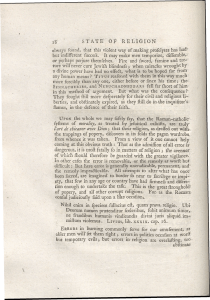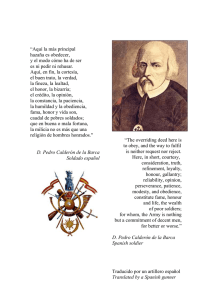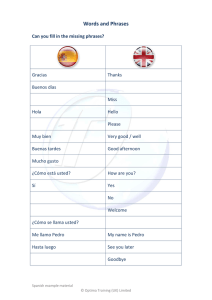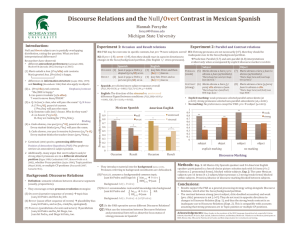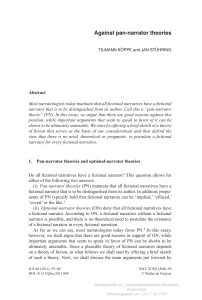The Death of the Narrator and the Interpretation of the Novel The
Anuncio
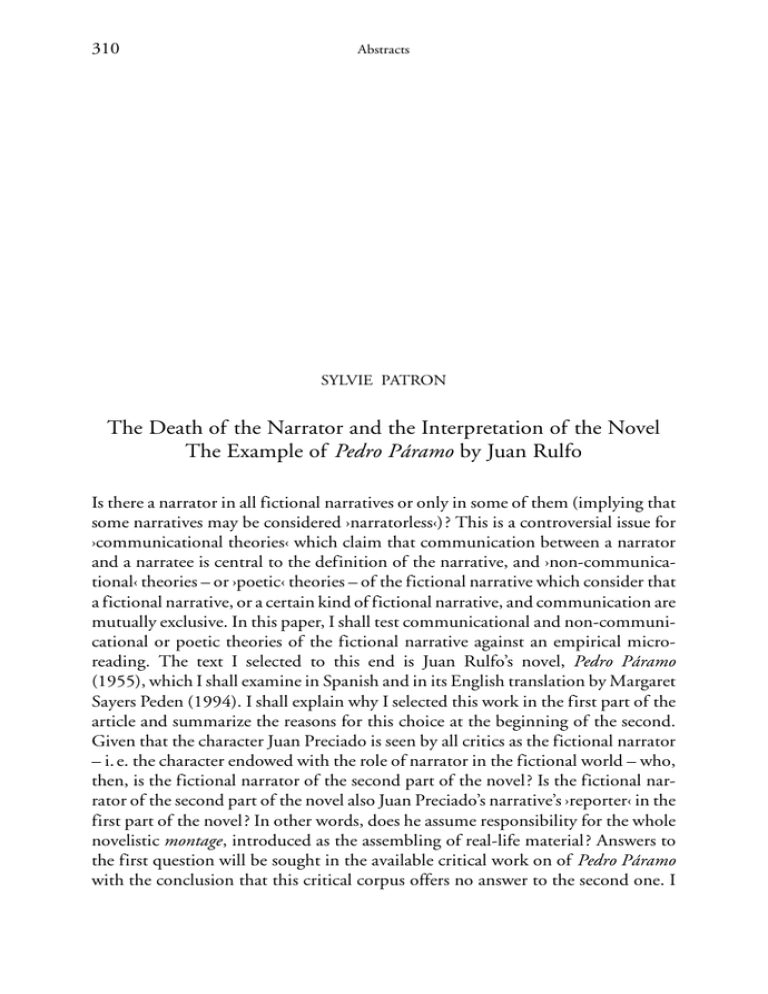
310 1 2 3 4 5 6 7 8 9 10 11 12 13 14 15 16 17 18 19 20 21 22 23 24 25 26 27 28 29 30 31 32 33 34 35 36 37 38 39 40 41 42 Abstracts SYLVIE PATRON The Death of the Narrator and the Interpretation of the Novel The Example of Pedro Pramo by Juan Rulfo Is there a narrator in all fictional narratives or only in some of them (implying that some narratives may be considered ›narratorless‹)? This is a controversial issue for ›communicational theories‹ which claim that communication between a narrator and a narratee is central to the definition of the narrative, and ›non-communicational‹ theories – or ›poetic‹ theories – of the fictional narrative which consider that a fictional narrative, or a certain kind of fictional narrative, and communication are mutually exclusive. In this paper, I shall test communicational and non-communicational or poetic theories of the fictional narrative against an empirical microreading. The text I selected to this end is Juan Rulfo’s novel, Pedro Pramo (1955), which I shall examine in Spanish and in its English translation by Margaret Sayers Peden (1994). I shall explain why I selected this work in the first part of the article and summarize the reasons for this choice at the beginning of the second. Given that the character Juan Preciado is seen by all critics as the fictional narrator – i. e. the character endowed with the role of narrator in the fictional world – who, then, is the fictional narrator of the second part of the novel? Is the fictional narrator of the second part of the novel also Juan Preciado’s narrative’s ›reporter‹ in the first part of the novel? In other words, does he assume responsibility for the whole novelistic montage, introduced as the assembling of real-life material? Answers to the first question will be sought in the available critical work on of Pedro Pramo with the conclusion that this critical corpus offers no answer to the second one. I Abstracts 1 2 3 4 5 6 7 8 9 10 11 12 13 14 15 16 17 18 19 20 21 22 23 24 25 26 27 28 29 30 31 32 33 34 35 36 37 38 39 40 41 42 311 shall then examine the problems raised by the presentation of the second part of Pedro Pramo as issuing from a fictional narrator, just like Juan Preciado’s narrative in the first part of the novel, which I shall divide into: 1) problems about the inner consistency of the critical discourse; 2) organizational problems concerning interpretive work; 3) problem of the falsification of erroneous interpretations. In the third part of this paper I shall suggest a possible critical reading of Pedro Pramo inspired from non-communicational or poetic theories of the fictional narrative, and detail its advantages. The Death of the Narrator and the Interpretation of the Novel 1 2 3 4 5 6 7 8 9 10 11 12 13 14 15 16 17 18 19 20 21 22 23 24 25 26 27 28 29 30 31 32 33 34 35 36 37 38 39 40 41 42 271 References Anderson, Danny J., The Ghosts of Comala. Haunted Meaning in Pedro Pramo. An Introduction to Juan Rulfo’s Pedro Pramo [2003], University of Texas Press (2007), www.utexas. edu/utpress/excerpts/rulped-intro.html (08. 12. 2010). Aronne-Amestoy, Lida, Utopa, paraso e historia. Inscripcin del mito en Garca Mrquez, Rulfo y Cortzar, Amsterdam/Philadelphia 1986. Banfield, Ann, The Formal Coherence of Represented Speech and Thought, PTL: Journal for Descriptive Poetics and Theory of Literature 3 (1978), 289–314. –, Pour Þtre l’avocat du diable de Flaubert, Langue FranÅaise 44 (1979), 19–26. –, Unspeakable Sentences. Narration and Representation in the Language of Fiction, London 1982. –, Linguistic Competence and Literary Theory, in: John Fisher (ed.), Essays on Aesthetics. Perspectives on the Work of Monroe C. Beardsley, Philadelphia 1983, 201–234. –, Literary Pragmatics [1992], in: William Bright (ed.), The International Encyclopedia of Linguistics, vol. 2, New York/Oxford 2003, 353–358. Bentez, Fernando, Conversaciones con Juan Rulfo [1980], in: Campbell 2003, 541–550. Benveniste, mile, The Correlations of Tense in the French Verb [1959], in: . B., Problems in General Linguistics, vol. 1, transl. by Mary E. Meek, Coral Gables 1971, 205–215. Blanco Aguinaga, Carlos, Realidad y estilo en Juan Rulfo [1955], in: Campbell 2003, 19–43. Bradu, Fabienne, chos de Pramo. Lecture de Pedro Pramo de Juan Rulfo [1989], transl. by Sylviane Descotte, Bruxelles 1995. Campbell, Federico (ed.), La ficcin de la memoria. Juan Rulfo ante la crtica, Mexico 2003. CarreÇo, Alejandro, Los narradores de Pedro Pramo [1997], UNIACC eCampus (2004), http://ecampus.uniacc.cl/Textos/cultura/careno/acareno3.htm (08. 12. 2010). De Toro, Alfonso, Los laberintos del tiempo. Temporalidad y narracin como estratgia textual y lectoral en la novela contempornea (G. Garca Mrquez, M. Vargas Llosa, J. Rulfo, A. RobbeGrillet), Frankfurt a. M. 1992. Doležel, Lubomr, Heterocosmica. Fiction and Possible Worlds, Baltimore/London 1998. Espinosa-Jcome, Jos T., La focalizacin inconsciente en »Pedro Pramo«, Madrid 1996. Frenk, Mariana, Pedro Pramo [1959], in: Campbell 2003, 44–54. Galbraith, Mary, Deictic Shift Theory and the Poetics of Involvement in Narrative, in: Judith F. Duchan/Gail A. Bruder/Lynne E. Hewitt (ed.), Deixis in Narrative. A Cognitive Science Perspective, Hillsdale 1995, 19–59. Genette, Grard, Narrative Discourse. An Essay in Method [1972], transl. by Jane E. Levin, Ithaca/New York 1980. Gonzlez Boixo, Jos Carlos, Claves narrativas de Juan Rulfo, Len 1980. –, Introduccin [1983], in: Juan Rulfo, Pedro Pramo, Madrid 2007, 9–52. Hamburger, Kte, The Logic of Literature [1957/21968], transl. by Marilynn J. Rose, Bloomington/Indianapolis 1993. Jimnez de Bez, Yvette, Juan Rulfo, del pramo a la esperanza. Una lectura crtica de su obra, Mexico 1990. Kayser, Wolfgang, Interpretacin y anlisis de la obra literaria [1948], transl. by Mara D. Mouto/Valentn Garca Yebra, Madrid 1970. –, Entstehung und Krise des modernen Romans, Stuttgart 1955. 272 1 2 3 4 5 6 7 8 9 10 11 12 13 14 15 16 17 18 19 20 21 22 23 24 25 26 27 28 29 30 31 32 33 34 35 36 37 38 39 40 41 42 Sylvie Patron Kuroda, Shigeyuki (S.-Y.), Where Epistemology, Style and Grammar Meet. A Case Study from the Japanese, in: Stephen R. Anderson/Paul Kiparsky (ed.), A Festschrift for Morris Halle, New York 1973, 377–391. –, Reflections on the Foundations of Narrative Theory – from a Linguistic Point of View [1975], in: Teun A. van Djik (ed.), Pragmatics of Language and Literature, Amsterdam/ New York 1976, 107–140. –, Some Thoughts on the Foundations of the Theory of Language Use, Linguistics and Philosophy 3:1 (1979), 1–17. –, The Reformulated Theory of Speech Acts. Towards a Theory of Language Use, Versus 26–27 (1980), 67–79. Leal, Luis, La estructura de Pedro Pramo [1964], in: Recopilacin de textos sobre Juan Rulfo, Havana 1995, 96–105. Llarena, Alicia, Realismo Mgico y Lo Real Maravilloso: una cuestin de verosimilitud (Espacio y actitud en cuatro novellas latinoamericanas), Gaithersburg 1997. Luraschi, Ilse Adriana, Narradores en la obra de Juan Rulfo. Estudio de sus funciones y efectos, Cuadernos Hispanoamericanos 308 (1976) 5–29. Martnez Bonati, Flix, La estructura de la obra literaria [1960], Barcelona 21972. –, Fictive Discourse and the Structures of Literature: A Phenomenological Approach [1960], transl. by Philip W. Silver, Ithaca/London 1981. Ortega, Jos, Estructura temporal y temporalidad en Pedro Pramo, in: J. O., Letras Hispanoamericanas de nuestro tiempo, Madrid 1976, 9–24. Ortega Galindo, Luis, Expresin y sentido de Juan Rulfo, Madrid 1984. Palaisi-Robert, Marie-Agns, Juan Rulfo: l’incertain, Paris 2003. Patron, Sylvie, Le Narrateur: Introduction la thorie narrative, Paris 2009. Rodrguez Monegal, Emir, Relectura de Pedro Pramo [1974], in: Campbell 2003, 121–135. Rulfo, Juan, Pedro Pramo, Mexico 1955. –, Pedro Pramo [1955], ed. by Jos Carlos/Gonzlez Boixo, Madrid 2007. –, Pedro Pramo [1955], transl. by Lysander Kemp, New York 1959. –, Pedro Pramo [1955], transl. by Margaret Sayers Peden, New York 1994. –, Pedro Pramo, treinta aÇos despus, Proyekto Patrimonio, El saln de lecturaen espaÇol de internet (1985), www.letras.s5.com/rulfo160202.htm (08. 12. 2010). Ruwet, Nicolas, Malherbe: Hermogne ou Cratyle?, Potique 42 (1980), 195–224. Searle, John R., The Logic Status of Fictional Discourse [1975], in: J. R. S., Expression and Meaning, Cambridge 1979, 58–75. Stanzel, Franz K., Narrative Situations in the Novel: Tom Jones, Moby Dick, The Ambassadors, Ulysses [1955], transl. by James Pusack, Bloomington/London 1971. –, A Theory of Narrative [1979], transl. by Charlotte Goedsche, Cambridge 1984. Tacca, Oscar, Las voces de la novela, Madrid 1973. Zepeda, Jorge, La recepcin inicial de Pedro Pramo (1955–1963), Mexico 2005. Full-length article in: JLT 4/2 (2010), 253-272. How to cite this item: Abstract of: Sylvie Patron, The Death of the Narrator and the Interpretation of the Novel. The Example of Pedro Páramo by Juan Rulfo. In: JLTonline (24.01.2011) Persistent Identifier: urn:nbn:de:0222-001508 Link: http://nbn-resolving.de/urn:nbn:de:0222-001508

